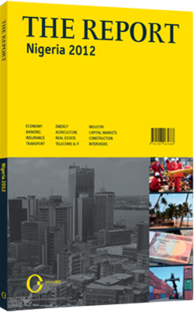Nigerian Breweries: Beverages
THE COMPANY: Nigerian Breweries is the leading brewing company in Nigeria, operating eight breweries and distributing across the country. The company has a rich portfolio of leading brands, including Star, Gulder, Legend, Climax, Heineken, Maltina, Amstel Malta and Fayrouz. As of December 2011, the company had 7.56bn outstanding shares, translating into a market capitalisation of N715bn ($4.6bn). In October 2011 Nigerian Breweries acquired majority equity stakes in Sona Systems and Life Breweries from Heineken NV. This followed Heineken’s acquisition in January 2011 of controlling stakes in five Nigerian breweries from Sona Group. The move allows Heineken to take advantage of the attractive growth opportunities in the Nigerian beer market.
The two leading beer producers in Nigeria are Heineken and Diageo, which together control roughly 95% of the market. Heineken (through its stakes in Nigerian Breweries and Consolidated Breweries) holds about 70% of the market, while Diageo (via its stakes in Guinness Nigeria) captures 25%. Nigerian Breweries maintained its lead in total volume sales in 2011 by an estimated 60.5%. The company continues to build upon the popularity of Star and Gulder, its leading brands, and its extensive promotion and distribution networks.
The breweries sector is expected to post a compound annual growth rate of 7% in total volume between 2010 and 2015. This increase is based on current marketing activities, the introduction of new products and more investors, expanding offerings and their penetration. In Nigeria, beer consumption has seen remarkable growth on the back of an expanding population, foreign investment in new production, increasing disposable incomes and shifting consumption patterns.
1Q12 RESULTS ANALYSIS: Earnings performance in 1Q12 was impressive amid pressured margins. Nigerian Breweries succeeded in growing turnover and gross profit by 29% and 32%, respectively. Post-tax profit stood at N9.4bn ($60.2m) in 1Q12, and revenues reflect the contribution from the recent acquisitions. This growth tempo is expected to hold to the year-end.
The cost-to-income ratio slowed to 53.2%, from 54.2% recorded in 1Q11, as the company worked to reduce input costs through local sourcing. Of note is that total production costs (accrued) of the acquired firms were up to 80% of sales prior to acquisition. A strong cost containment initiative despite strategic acquisitions suggests that the company can increase the economies of scale in its cost structure. Gross profit margin was 46.84%, while profit before tax and profit after tax margins returned slower (affected by huge interest expenses) at 20.89% and 13.98%, respectively. Interest expense for the period stood at N1.67bn ($10.7m) against N16.54m ($105,856) in 1Q11. The increased interest expense is indicative of acquisition-related debt deals.
Nigerian Breweries benefitted from a remarkable improvement in its return on equity, up from 26.2% in 2005 to 60.8% in 2011. A generous dividend payment history and strong free cash flow generation are key attraction points. In fiscal year (FY) 2011, Nigerian Breweries declared a dividend of N3 ($0.019), translating into a 3.1% yield. Based on the FY11 payout ratio of 60% and expected profitability growth in the near term, Nigerian Breweries is likely to outperform this dividend yield in FY12. A rise in the retention rate is also anticipated, given potential revenue from acquisition.
DEVELOPMENT STRATEGY: Nigerians’ demand for beer will undoubtedly continue its steep incline, given the growing population levels. Consumption of beer is projected to rise to 23m hl by 2015 based on current per capita consumption and an annual population expansion rate of about 2.8%, comfortably supporting growth in the local brewery industry. Nigerian Breweries’ continued launches of branded products indicates that it is already seeking out the incremental high-growth opportunities. The progress seen in key performance indicators in 1Q12 will continue to run through FY12. As such, the main consideration remains the potential market share loss arising from competition, just as Guinness Nigeria continues to expand its footprint in its bid to improve its own competitive position.
You have reached the limit of premium articles you can view for free.
Choose from the options below to purchase print or digital editions of our Reports. You can also purchase a website subscription giving you unlimited access to all of our Reports online for 12 months.
If you have already purchased this Report or have a website subscription, please login to continue.

